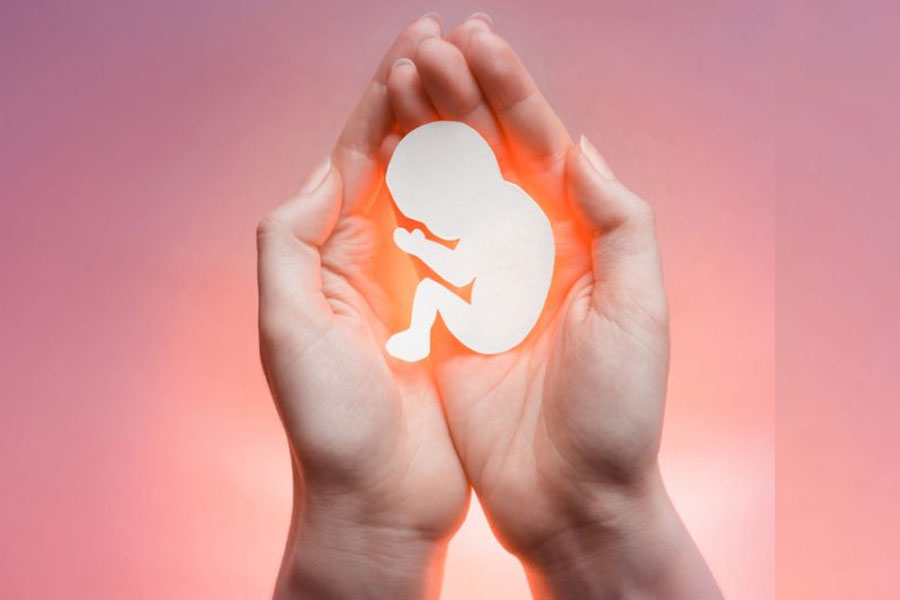If you’d ask every other person you came across what is their thought about abortions, you will not only receive multiple answers and looks, but also a good scolding about how it is not allowed in different religions to commit ‘murder’.
Each person has their own perception when it comes to the topic, nonetheless, abortions are legal in Pakistan. Previously, they were permissible only for the purpose of saving a woman’s life.
The Law
Reportedly, in 1997, there was an addition to add a clause in Chapter XVI, Section 338 of the PPC:
Induced abortion is also permissible ‘before the limbs or organs of the baby have been formed for the purpose of ‘necessary treatment’.
This stipulation, regarding limbs and organs is based on Islamic law, which states that induced abortion is permitted until the ‘quickening’ of the foetus—up to 20 weeks gestation, according to Pakistani medical practice.
Induced abortions that fall outside these conditions may be punished with prison sentences ranging from three to ten years but, according to lawyer Sarah Malkani, there have been no cases of incarceration for abortion-related offences.
338. Isqat-i-Hamal. − Whoever, causes a woman with a child whose organs have not been formed, to miscarry, if such miscarriage is not caused in good faith for the purpose of saving the life of the woman or providing necessary treatment to her, is said to cause isqat-i-haml.
Explanation.− A woman who causes herself to miscarry is within the meaning of this section.
338-A. Punishment for Isqat-i-haml.−, Whoever, cause isqat-i-haml shall be liable to punishment as ta’zir-
| (a) | with imprisonment of either description for a term which may extend to three years, if isqat-i-haml is caused with the consent of the woman, or |
| (b) | with imprisonment of either description for a term which may extend to ten years, if isqat-i-haml is caused without the consent of the woman.− |
Provided that, if as a result of isqat-i-haml, any hurt is caused to a woman or she dies, the convict shall also be liable to the punishment provided for such hurt or death as the case may be.
338-B. Isqat-i-janin.− Whoever, causes a woman with child some of whose limbs or organs have been formed to miscarry, if such miscarriage is not caused in good faith for the purpose of saving the life of the woman, is said to cause Isqat-i-janin.
Explanation.− A woman who causes herself to miscarry is within the meaning of this section.
338-C. Punishment for Isqat-i-janin. − Whoever, causes isqat-i-ianin shall be liable to,
| (a) | one-twentieth of the diyat if the child is born dead, |
| (b) | full diyat if the child is born alive but dies as a result of any act of the offender, and |
| (c) | imprisonment of either description for a term which may extend to seven years as ta’zir− |
Provided that, if there is more than one child in the womb of the woman, the offender shall be liable to separate diyat or ta’zir, as the case may be for every such child.
Provided further that if, as a result of isqat-i-fanin, any hurt is caused to the woman or she dies, the offender shall also be liable to the punishment provided for such hurt or death, as the case may be.
The Problem
One of the major issues in this clause is that ‘necessary treatment’ has not been defined further, meaning it is open-ended. Furthermore, the law does not specify the situations in which a woman would ‘need’ an abortion, leaving this decision in the hands of healthcare practitioners.
Moreover, given a lack of clarity in interpreting the law, legal abortion services are difficult to obtain, and most women who have an abortion resort to clandestine and unsafe procedures if the said healthcare professional feel that the person or their situation does not match with their interpretation of the clause stated above.

Source: Abortion law in Muslim-majority countries: an overview of the Islamic discourse with policy implications by Gilla K Shapiro
The Stats
*Statistics regarding the prevalence of induced abortion in Pakistan are scanty, scattered and hospital-based.
According to a 2020 survey, Pakistan has an annual abortion rate of 50 per 1,000 women as per a 2012 survey. One of the biggest reasons behind abortions is believed to be a lack of awareness about contraceptives, family planning, and health issues that may arise.
In 2012, an estimated 623,000 Pakistani women were treated for complications resulting from induced abortions, 367,334 cases from Punjab, 149,424 from Sindh, 68,486 from KP and 37, 356 came from Baluchistan.
According to estimates, the new number of induced abortions is now 890,000 every year in the country and the procedure is usually desired by women who already have 5 to 6 children in the household as compared to unmarried women.
Citing a survey, Dr Nighat Shah stressed that abortion was purely a health issue and must not be confused with religion and culture. Imtiaz Kamal, president of the Midwifery Association of Pakistan, said Pakistan laws permitting abortion could be done to save a life and to carry out the necessary treatment.
“Professional values are more important than personal beliefs. Healthcare providers must refer the patient seeking an abortion to the right place if they are not willing to carry out the procedure,” she added.
Lack of Awareness
In Pakistan, even during the 21st century where man has progressed so far in life, it is still considered taboo to openly discuss sex with a spouse. Women are usually labelled with a stamp of ‘bad character if she attempts to talk about sexuality, preferences, or anything of said nature.
At the same time, talks of contraceptives are also taboo. Furthermore, when it comes to children, there is a common belief amongst many households that children are a gift from God, hence, if a woman is pregnant, it is his will and they simply have to accept it, even if a family has 5-6 children to feed already.
Contraceptive use—including both traditional and modern methods—among married women has risen slowly, from 30% in 2007 to 35% in 2013. The use of modern methods has increased from 22% to 26% over this period, however, it still has to be adopted by a majority of couples.
Dr Shershah Syed, a senior gynaecologist, shared that 30,000 women died every year in Pakistan because of pregnancy-associated complications that put the maternal mortality rate at about 276 per 100,000 live births.
Complications of miscarriages/ abortions, he said, accounted for 10 to 12 per cent of maternal deaths while one out of six pregnancies was terminated by induced abortion through a risky method.
“Due to a lack of health services and access to modern family planning methods, a large number of abortion-related complications worsen the maternal health situation in our country. Besides, cases of abortion are mismanaged by untrained healthcare providers,” he said, adding that about 36.81pc of abortions were conducted by unskilled traditional birth attendants.
Reproductive and sexual health issues, including early marriages, unplanned pregnancies and sexually transmitted diseases, he said, increased the burden on women’s health.
Healthcare Workers are ‘Too Shaky’ Towards Abortions
According to research published in the Journal of the Pakistan Medical Association, the majority of health care providers (67.3%) had an unfavourable attitude to induced abortion. Only 25% favoured induced abortion.
All health care providers were aware of the abortion laws of the country and 46.5% did not think that any change was necessary. Only 37.7% wanted the law to be changed. Surprisingly 80.9% of those, who wanted the law to be changed, said that the existing law was too liberal and should be made more strict. Only 19.1% wanted the abortion law to be liberalized.
The Ignorance, Consequences, & Results
Dr Xaher Gul, a gynaecologist, believes that refusing to administer an abortion violates both the Hippocratic Oath and Standard 26 of the national abortion guidelines. Moreover, Gul shared an account of how once a woman outside Dr Ruth Pfau Civil Hospital, one of Karachi’s largest public health facilities was murdered by a member of her family.
She was begging the gynaecologist for an abortion and the doctor swore at her, told her to go die at home. And then she got shot.
One of the issues that young women face is when the healthcare professionals are them, how did they get pregnant? If a woman admits to being involved with consent, the professionals usually refuse to move forward with the procedure, which is why most of the time they have to lie, saying it was forced or nonconsensual.
Dr Saadia Ahsan Pal, a gynaecologist, shared an account of a young woman she knew. She shares that 20-year-old Maha was 2.5 months pregnant and no one was willing to perform an abortion.
“Finally, a nurse at the hospital where I got my ultrasound suggested a doctor at another hospital.” When Maha approached her, the doctor kept asking how she’d gotten pregnant. “I lied about being pregnant with a rapist’s child because she wouldn’t have been willing to perform the abortion if I told her it was consensual sex that bore this.”
Sharing another account, Dr Pal recalls saying that once a colleague had refused to perform an abortion, the patient then later asked the doctor if she would be willing to deal with her post-abortion complications, in the event that she induced abortion at home.
Zahra recently graduated from a five-year MBBS programme at a public medical college in Karachi and opened up sharing that she was taught nothing about the legal status of abortions in the country. In fact, she didn’t know about Article 338 of the PPC—and the ‘necessary treatment.
Abortion Clinics in Pakistan
While the abortion laws are still blurry, there are many clinics across the country that help women with the procedure, be they rape victims, martial abuse victims, or facing severe mental distress, all regardless of their marital status.
These clinics include:
- Maris Stopes Society Clinic (Karachi)
- Concept Fertility Centre (Karachi)
- Lady Dufferin Hospital (Karachi)
Self Induced Abortions
Women who have been shamed or are too afraid for their lives have now chosen another path. Instead of going to a clinic and getting an abortion under supervision, they go to the pharmacy to buy available drugs that can induce the abortion.
When will abortion finally become a topic that will be talked about in full? We’ll never know. But for now, what we do know is that this topic is the need of the hour.
Until next time, stay tuned to WOW360 for more news and updates.
